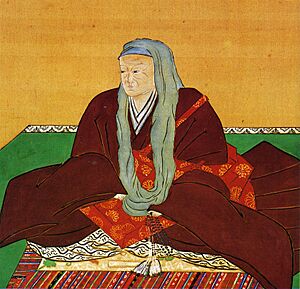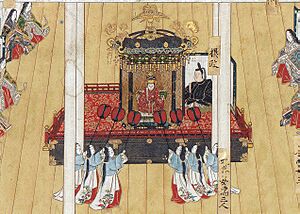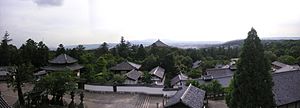Emperor Reigen facts for kids
Quick facts for kids Emperor Reigen霊元天皇 |
|||||
|---|---|---|---|---|---|
 |
|||||
| Emperor of Japan | |||||
| Reign | 5 March 1663 – 2 May 1687 | ||||
| Coronation | 2 June 1663 | ||||
| Predecessor | Go-Sai | ||||
| Successor | Higashiyama | ||||
| Shōguns |
See list
Tokugawa Ietsuna
Tokugawa Tsunayoshi |
||||
| Born | Satohito (識仁) 9 July 1654 Tokugawa shogunate (now Japan) |
||||
| Died | 24 September 1732 (aged 78) Honshu, Tokugawa shogunate |
||||
| Burial | Tsuki no wa no misasagi, Kyoto | ||||
| Spouse |
Takatsukasa Fusako
(m. 1670; died 1712) |
||||
| Issue among others... |
Emperor Higashiyama | ||||
|
|||||
| House | Yamato | ||||
| Father | Emperor Go-Mizunoo | ||||
| Mother | Sono Kuniko | ||||
Satohito (Japanese: 識仁), later known as Emperor Reigen (霊元天皇, Reigen-tennō, 9 July 1654 – 24 September 1732), was the 112th emperor of Japan. He ruled from 1663 to 1687. His reign was a time when the Tokugawa shogunate (a military government) held much of the power in Japan.
Contents
Family and Early Life
Before becoming emperor, his personal name was Satohito. He was also known as Ate-no-miya.
Reigen was the 19th son of Emperor Go-Mizunoo. His mother was Lady-in-Waiting Kuniko. She was the daughter of a powerful minister named Sonomotooto.
Emperor Reigen had a large family. He lived with his family in the Dairi (Inner Palace) of the Heian Palace. His family included many sons and daughters.
One of his most important children was Imperial Prince Asahito. He later became Emperor Higashiyama.
His special name, Reigen, was given to him after his death. It was created by combining parts of the names of two earlier emperors.
Important Events During Reigen's Reign
- 9 July 1654: Prince Satohito was born. He would later become Emperor Reigen.
- 1654: Prince Satohito was chosen to be the next emperor. However, he was very young. So, his older brother, Emperor Go-Sai, became emperor first. This was to allow Satohito to grow older.
- 5 March 1663: Emperor Go-Sai stepped down from the throne. Prince Satohito then officially became the new emperor. This is called his senso (receiving the succession). Soon after, he had his formal coronation ceremony (sokui), and his rule began.
- 1665: Courts were set up across Japan. Their job was to find and stop any remaining Christianity in communities.
- 1667: A fire destroyed the main building of Nigatsu-dō temple in Nara. Work began to rebuild it.
- 13 February 1668: A huge fire broke out in Edo (now Tokyo). It lasted for 45 days and was thought to be started on purpose.
- 1669: There was a famine (a time when there isn't enough food). Also, a military group was sent to northern Honshū to deal with Shakushain's Revolt.
- 1673: A big fire happened in Kyoto.
- 21 May 1673: The Chinese Buddhist teacher Ingen passed away. He died at the Manpuku-ji temple in Uji.
- 1675: Another large fire struck Kyoto.
- 4 June 1680: The shōgun (military leader) Tokugawa Ietsuna died. He was replaced by Tokugawa Tsunayoshi.
- 15 June 1680: Emperor Reigen's father, former-Emperor Go-Mizunoo, died.
- 1680: A major flood caused damage in Edo.
- 1680: The Gokoku-ji temple was built in Edo.
- 5 February 1682: Another big fire swept through Edo.
- 1681: A severe famine hit Kyoto and the areas around it.
- 1682: Prince Tomohito was named the Crown Prince. A special ceremony was held for this, which hadn't happened for over 300 years!
- 26 March 1685: Former-Emperor Go-Sai died. A large comet was seen in the night sky around this time.
- 2 May 1687: Emperor Reigen decided to step down from the throne. He passed the role to his fifth son, who became Emperor Higashiyama.
- 1687: After giving up the throne, Reigen continued to have influence as a "cloistered emperor." This means he retired to a palace called the Sentō-gosho but still had some power.
- 4 December 1696: Former Empress Meishō died.
- 1713: Former-Emperor Reigen joined a monastery (a place where monks live) and took the name Sojō.
- 1715: His 13th daughter, Princess Yoshiko, married the seventh Tokugawa shōgun, Tokugawa Ietsugu.
- 1716: The seventh Tokugawa shōgun, Tokugawa Ietsugu, died at the age of 7.
- 24 September 1732: Reigen died at 78 years old.
Emperor Reigen was buried at his special Imperial tomb (called a misasagi). It is located at Tsuki no wa no misasagi in Sennyū-ji temple in Kyoto. Many other emperors are also buried there.
Eras During Reigen's Rule
In Japan, years are grouped into special periods called nengō. Here are the eras during Emperor Reigen's time as emperor:
See also
 In Spanish: Reigen Tennō para niños
In Spanish: Reigen Tennō para niños
- Emperor of Japan
- List of Emperors of Japan
- Imperial cult
| Regnal titles | ||
|---|---|---|
| Preceded by Emperor Go-Sai |
Emperor of Japan: Reigen 1663–1687 |
Succeeded by Emperor Higashiyama |
 | Chris Smalls |
 | Fred Hampton |
 | Ralph Abernathy |



